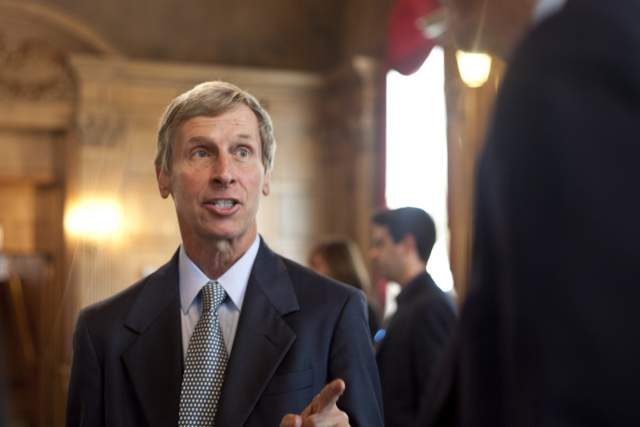As a candidate, Lynch received media training from his PR team, and he rehearsed answers to common questions. Still, sometimes a reporter would put a microphone in front of him and ask a question he didn’t know the answer to. “You just do the best you can,” he says. “Sometimes you say you just don’t know. Sometimes you can answer the question you want to answer. You can also elevate the question to a higher level, which makes the answer a little easier.”
Market Research
Just as in the private sector, where companies do market research about their products and their competitors’ products, candidates for public office also research their market. Mostly through phone polls, Lynch’s campaign researched questions such as name recognition, priority of issues, messaging, and favorability. “This allows you to see which messages resonate more with the voters, and you use that information in the development of your speeches and television advertising,” Lynch explains.
Position on Issues
There are hundreds of public policy issues, and as a candidate you need to have an informed opinion about each one. With help from his policy expert, Lynch studied the relevant issues so he knew enough to answer questions from the public and the media.
Can You Get the Votes?
A candidate determines how many votes she needs to get elected by looking at the trends of the previous 10 elections. Say you need 350,000 votes to win. Where are they going to come from? You divide the state into towns, wards and precincts and set vote targets for each one. Then you get city, town and ward organizers to get the word out, identify people who will vote for you, and get those people to the polls. “It’s a huge organizational effort,” Lynch says, “which is why a good field manager is crucial. They recruit the organizers and the volunteers on the ground.”
Segmenting the Market
Most politicians segment the voting market in predictable ways: Democrat (left, middle), Independent, and Republican (moderate, conservative). Then they zero-in on their base: the people most likely to vote for them. “The pundits say, You’ve got to protect your base,’” Lynch says.
I was never a partisan Democrat. I cared about people on their own level, not where they fell on the political spectrum.
But Lynch didn’t think only of his market that way. He segmented his market as the citizens would define themselves: police officers, fire fighters, teachers, children, veterans, business people, and the elderly, among others.
“I liked this way better because it reflects who I am,” Lynch says. “I was never a partisan Democrat. I cared about people on their own level, not where they fell on the political spectrum.”
What to do on Election Night
By this point, most of the work is done. Lynch wouldn’t take it easy, however. He stayed out shaking hands at the polls until they closed around 8:00 p.m. He would usually go to a friend’s house to wait for the results. That’s when a candidate starts contemplating a tough question: What if I lose? In Lynch’s first election, he had a comfortable lead for most of the day, but the margin began shrinking in the afternoon. That’s bad for a Democrat in New Hampshire, because votes from the conservative small towns are reported last. At one point, the margin was down to 15,000 votes. “I was very anxious,” Lynch says. “My wife tried to console me by saying we did the best we could.”
Lynch never lost an election, so he didn’t have to deal with failure on the public stage. But it’s a good idea for a candidate to prepare herself or himself for the possibility. “You put your heart and soul and money into it, and you either win or lose,” Lynch says. “It’s a tough game.”
That All Said…
“Being governor is a great job,” Lynch relates. “The governor has an enormous ability to make a real and positive difference in the lives of so many people. So, if that is something that motivates you, go for it!”
Governor Lynch welcomes inquiries and feedback. He can be reached at john.h.lynch@tuck.dartmouth.edu

